NRL trials: Pre-season Challenge, World Club Challenge games delayed over concerns for hot weather, player safety
The NRL has made the decision to delay kick-off times for three Pre-Season Challenge matches, amid fears for player safety with temperatures just below 40 degrees expected.
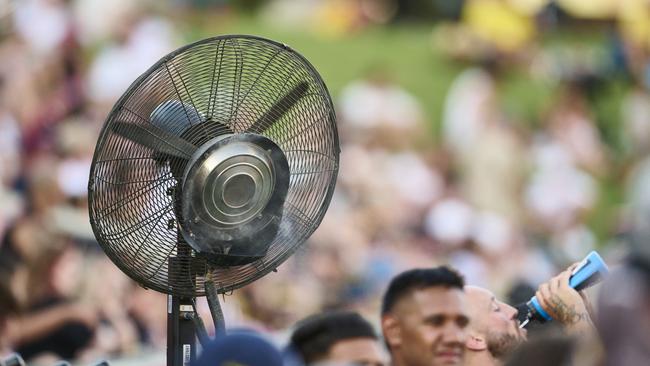
The NRL has made the decision to move kick-off times for three of this weekend’s trial matches amid fears for player safety in the forecast sweltering conditions.
Three Pre-Season Challenge matches, including the World Club Challenge between Penrith Panthers and St Helens, have been moved as temperatures are set to reach 38 degrees on Saturday.
In a statement released on Tuesday evening, the NRL confirmed it would adjust the kick-off times after discussions with broadcasters.
The Charity Shield match between St George Illawarra and South Sydney on Saturday in Mudgee, where the temperature is expected to reach 36 degrees, has been moved from a 3.30pm kick-off to 4.20pm.
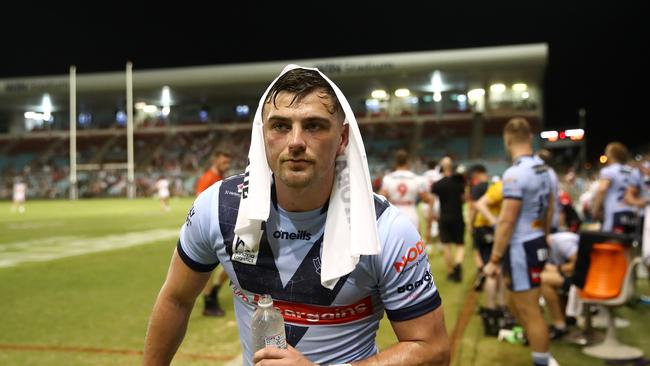
The World Club challenge, which was due to start at 6pm in Penrith where the mercury is tipped to hit 38, will instead begin at 6:50 pm.
Saturday night’s Queensland derby between the Broncos and Cowboys at Sunshine Coast Stadium will start 35 minutes later at 8.55pm (7.55pm local time).
“The decision was made due to player safety concerns around the forecasted heat and humidity in Regional NSW and Western Sydney,” the NRL statement said.
“The NRL would like to thank broadcast partners FOX, SKY NZ and SKY UK as well as participating clubs (St George Illawarra Dragons, South Sydney Rabbitohs, Penrith Panthers, St Helens, Brisbane Broncos and North Queensland Cowboys) as well as venues for their cooperation and flexibility.”
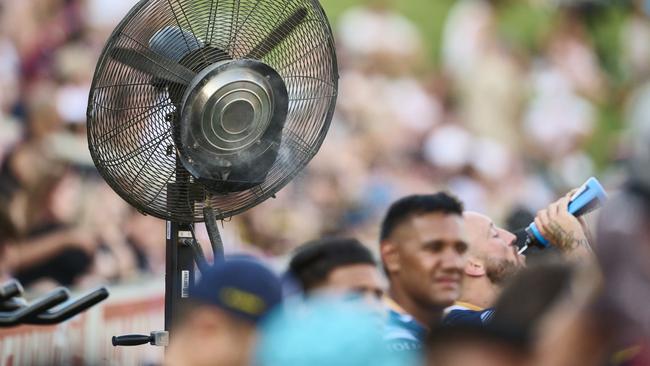
The changes cap a successful campaign by The Daily Telegraph, after leading sports doctor Nathan Gibbs this week sounded a warning over playing in extreme temperatures.
“Serious heat illness can kill you,” the former Souths forward and first grade doctor said. “Heat stroke is deadly.
“Heat stress doesn’t occur suddenly. You need the medical staff to closely monitor players who are starting to develop signs of dehydration, which include fatigue, cramping and exhaustion.”
The move comes after former front-rower Danny Shepherd raised concerns about the dangers of extreme temperatures after he spent a month in a coma and never played football again after collapsing during a game between Eastern Suburbs and Gold Coast in 1990.
EXCLUSIVE: MY FEARS FOR NRL STARS AFTER HEAT STROKE ALMOST KILLED ME
—Dean Ritchie
For the past 33 years, around this time, Danny Shepherd starts to worry about rugby league players struggling in the fierce heat.
He fears they could collapse from heat stroke — just like he did.
Sydney’s heat nearly killed Shepherd.
Now 62, the former front-rower spent four weeks in a coma after being struck down by heat stroke during an early-season match for Eastern Suburbs against Gold Coast at the SFS in 1990.
Shepherd’s mates say doctors cut a slit in the player’s throat to ensure he could breathe freely.
Shepherd was on life support and doctors asked his wife the toughest question of all.
“We were asked to consider turning off his life support,” Sue Shepherd said.
There was a church vigil at Mary Immaculate Catholic Church, Waverly, to essentially say goodbye.
“You just don’t get asked to get together at mass and pray for someone — it wasn’t good,” said close mate and former Roosters teammate Wayne Marshall. “Danny was in a coma — he wasn’t in a good way.”
Now, Shepherd watches on with concern as Penrith prepare to play St Helens in the World Club Challenge this Saturday with temperatures in Western Sydney forecast to reach between 36 and 40 degrees.
It brings back frightening memories of the day Shepherd collapsed in front of shocked teammates on-field before being rushed to St Vincent’s Hospital. He made a full recovery but never played first grade again.
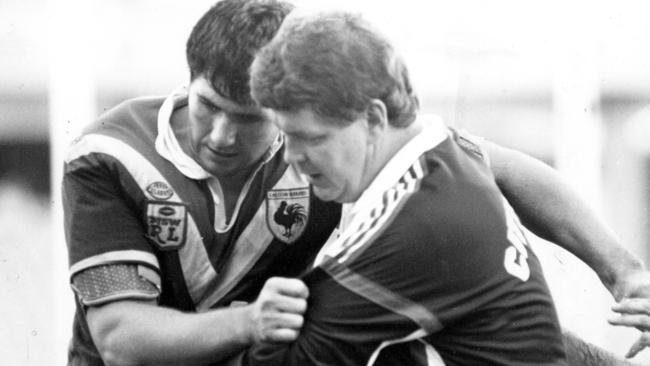
“I was in a coma for 14 days and was in hospital for six weeks,” Shepherd told The Daily Telegraph.
“It was really serious, I was touch and go. Things weren’t looking good.
“I was on life support. After I got out, I spent a month on dialysis because I had liver and kidney failure. I had to go to dialysis every day.
“They actually had a service for me, it was Cardinal Freeman. They had that because they thought, more or less, than I wouldn’t be here.
“It was a frightening time. It could have been a different outcome and I might not have been here.
“The specialist said I had intravascular coagulation. The lucky part was that I got out of it all and I’ve come through it well.
“Touch wood, I was lucky. And I have no side-effects.
“Runners who have had heat stroke have lost their legs and had their muscles fade away.
“When I woke from the coma everything was blurry. They had tied up all my fingers because I kept pulling tubes out in my sleep.
“I don’t remember the (incident). I don’t even recall going to the game. I got lucky but it was worse for my wife and kids. They had to go through it but I don’t remember anything other than waking up in hospital.
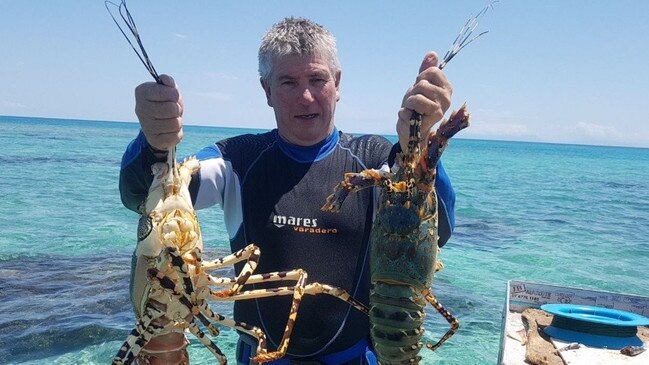
“They put it down as heat stroke. It wasn’t conclusive but that’s what they reckon it was — heat stroke. Back then, that was probably the fittest I’ve ever been and I was pushing myself harder.
“I haven’t had any problems since but I still get myself checked once a year.”
The Daily Telegraph revealed on Monday the concerns over playing in Penrith in such heat, with the match due to start at 6pm.
NRL management has implemented new rules allowing 18 players to be used by each team, increased interchanges from eight to ten, added additional water breaks, ensured the game is contested in 20-minute quarters and reduced restrictions on trainers carrying water on the field.
Leading sport doctor, Nathan Gibbs, said: “Serious heat illness can kill you. Heat stroke is deadly.”
Shepherd knows a solution to playing trial matches in the heat is difficult to find but has some suggestions.
“I do get concerned,” he said. “Every year there is talk about playing in the heat and heat stroke. Maybe play at night when it’s cooler.
“Perhaps they could look at unlimited interchange and play matches in quarters.
“There isn’t a lot they can do about it other than monitor the players more; maybe not have trials or put the season back until the cooler weather arrives but I don’t think you can do that.
“From when I was playing until now, the players are more educated, looked after and monitored differently and they are all full time professionals. They’re super fit.”
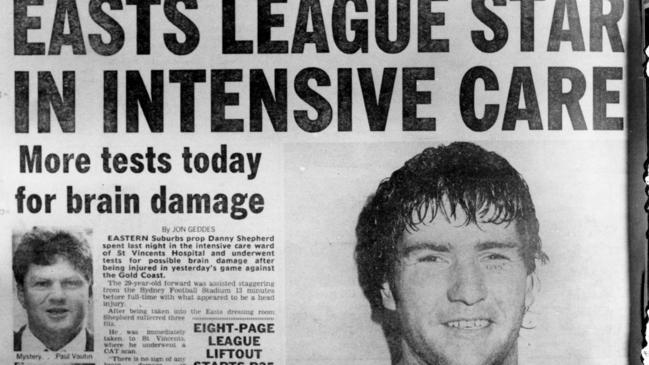
Former Test star Paul Vautin was part of the Easts side that day when Shepherd’s life changed forever.
“He was cooked,” Vautin said. “They rushed him to hospital, it wasn’t good. It alarmed all the players, I know that.”
Shepherd left Sydney after recovering and hasn’t returned.
He moved back to be near his parents in Torrens Creek and worked 20 years in the mines before retiring in Cardwell, a small town located between Cairns and Townsville.
Shepherd played two years of bush footy with Cardwell before losing his passion for rugby league.
He loves fishing and also helps out a mate who is a plumber.
“Cardwell is a beautiful part of the world,” he said.
A giant prop, Shepherd played 41 first grade games for Easts between 1987 and 1990, including the ’87 preliminary final against Canberra at the SCG.
Death stroke: ‘Deadly’ heat warning for World Club Challenge
A former first grade star who became a leading sports doctor has spoken about the “deadly” consequences of playing top-level rugby league in Sydney’s blazing February heat as the NRL confirmed a raft of player safety initiatives for the prestigious World Club Challenge.
The temperature in Penrith on Saturday for the Panthers match against English Super League champions St Helens is forecast to top somewhere between 36 and 40 degrees. Monday’s temperature back in St Helens is just two degrees.
It comes after a NSW Cup referee was hospitalised on Saturday due to dehydration after adjudicating a game in Penrith.
The referee felt unwell after a game and was taken to hospital for rehydration and observation. He was discharged last Saturday night.
There is no suggestion the WCC may be cancelled or postponed but the NRL is closely monitoring the Bureau of Meteorology’s heat forecast for Sydney’s west.
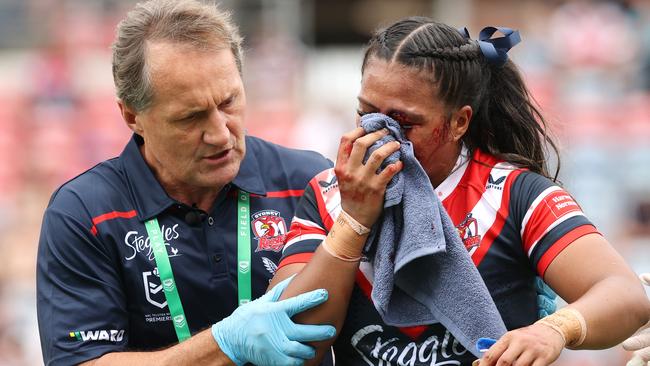
“Serious heat illness can kill you,” said former Souths forward Nathan Gibbs, the Waratahs doctor who just returned from Narrabri where temperatures hit 36 degrees for a trial game between NSW and Queensland. “Heat stroke is deadly.
“Heat stress doesn’t occur suddenly. You need the medical staff to closely monitor players who are starting to develop signs of dehydration, which include fatigue, cramping and exhaustion.
“The Australian players have been training here all summer so they are acclimatised to the heat. Acclimatisation is a big part of preparing for heat stress.”
Due to the expected heat, the NRL has implemented new rules for the WCC allowing:
* Eighteen players to be used by each team.
* Increased interchanges from eight to 10.
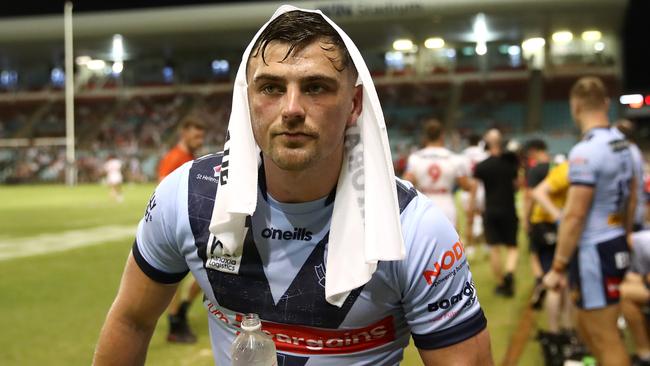
* Additional water breaks with the game to be contested in 20-minute quarters.
* Reducing restrictions on trainers carrying water on the field.
“This comes through consultation and an agreement by both clubs and is in recognition of the conditions, particularly for a team coming from the northern hemisphere,” said NRL head of football, elite competitions, Graham Annesley.
“Normally the World Club Challenge would be played under regular competition rules but as a concession to the expected conditions, we have relaxed those rules. The normal heat provisions will also apply.
“The weather at this time of year is always hot, regardless of who is playing and where.
“That’s why the NRL has heat guidelines in place which can be automatically kicked in once the two team doctors are satisfied there is a requirement for them.”
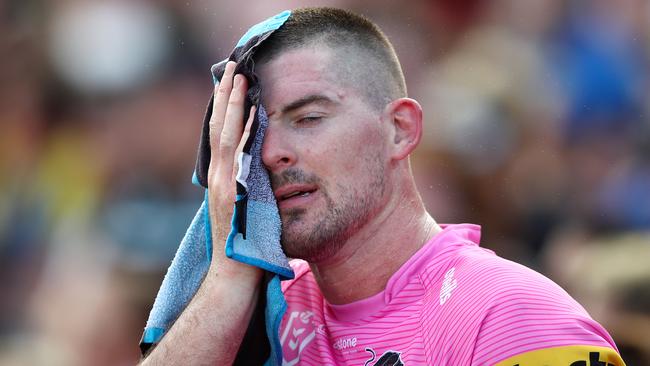
The NRL does use a heat policy called the Heat Stress Index, which measures the environmental temperature and conditions along with air temperature, humidity and wind flow.
There is a cut off temperature where a game can be abandoned but it is rare.
St Helens did arrive in Australia during late January to acclimatise and played in 24 degree temperatures during Saturday’s WCC warm-up game against St George Illawarra in Wollongong.
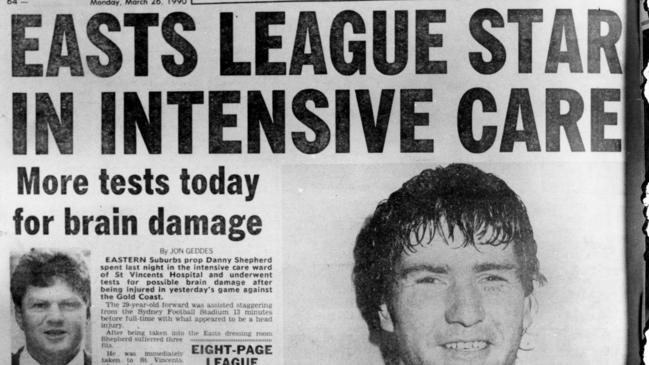
Many in rugby league still recall the shocking and frightening demise of Easts prop Danny Shepherd back in 1990.
Shepherd sustained heat stroke in a game against Gold Coast in an early-season match against Gold Coast and spent 11 days at St Vincent’s Hospital.
There were genuine fears Shepherd would die. He did make a full recovery but never played first grade again.







To join the conversation, please log in. Don't have an account? Register
Join the conversation, you are commenting as Logout